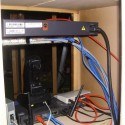
After running network cables the next step, of course, is to terminate them.
Using one of the old cabinets that happened to be close to the right size, I built a rudimentary 19″ rack. It’s not too bad for a DIY rack, especially considering a small swing-out metal rack costs around $250.
I basically took an old cabinet, cut the middle shelf out and turned the whole thing on its side.
Well finally wireless number portability is coming to Canada on March 14th. This means you will be able to transfer your wireless number to wireless another carrier, to a landline, or your landline to a wireless carrier. Transfers between wireless carriers should take 2.5 hours, transfers between wireless and landline could take up to two days, and fees for doing a transfer are left up to individual providers. I haven’t yet found out if transfers from wireless or landline to VoIP carriers will be possible, although I don’t see why it wouldn’t be.
I felt compelled to respond to an article NetworkWorld published (which made Slashdot) that talks about how VoIP and security systems are incompatible (as in home or business burglar alarms), and is apparently based on an article published by CBC. It does raise some valid points, but mostly it is sensational garbage.
First off, as the article correctly points out, VoIP does require power, so if you lose power, then you lose your phone line.
I haven’t posted here in a while, so I just thought I’d mention something about freePBX 2.2.0, which was just released a couple days ago. For those that don’t know, freePBX is an open source configuration and web-based interface to Asterisk, which allows you to configure and run a PBX that has the equivalent functionality to commercial PBXs costing several thousands of dollars (or more). I’ve been involved with the freePBX project since December 2004 (when it was called AMPortal, or AMP for short), and minus a 6 month hiatus in early 2006, I have been contributing to the project ever since.
I came across an interesting article showing that running VoIP over a (TCP-based) VPN actually improves call quality. This goes against what you would expect – VoIP traffic uses UDP to ensure the least amount of latency, while TCP ensures all packets arrive in order, but means that one holdup can stall the whole stream.
Once they investigated more, it actually makes sense why this happens. The VPN ensures that all packets get there, in order, which yields a better call.
It’s at least a start: RIM (the makers of the Blackberry) have announced an acquisition of Ascendent Systems, a company that makes software for connecting mobile phones to corporate phone systems. This means that companies using Blackberries will be able to basically turn the Blackberry into an extension on their phone system.
I can’t find a ton of technical details, but apparently it supports SIP. It says the cell phones get full functionality of the deskphones, like 4 or 5 digit extension dialing, conferencing, transfers, parking, etc.
 After running network cables the next step, of course, is to terminate them.
Using one of the old cabinets that happened to be close to the right size, I built a rudimentary 19″ rack. It’s not too bad for a DIY rack, especially considering a small swing-out metal rack costs around $250.
I basically took an old cabinet, cut the middle shelf out and turned the whole thing on its side.
After running network cables the next step, of course, is to terminate them.
Using one of the old cabinets that happened to be close to the right size, I built a rudimentary 19″ rack. It’s not too bad for a DIY rack, especially considering a small swing-out metal rack costs around $250.
I basically took an old cabinet, cut the middle shelf out and turned the whole thing on its side.